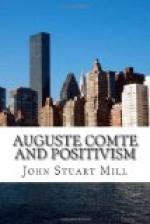Worse, however, remains to be told. M. Comte selects a hundred volumes of science, philosophy, poetry, history, and general knowledge, which he deems a sufficient library for every positivist, even of the theoretic order, and actually proposes a systematic holocaust of books in general—it would almost seem of all books except these. Even that to which he shows most indulgence, poetry, except the very best, is to undergo a similar fate, with the reservation of select passages, on the ground that, poetry being intended to cultivate our instinct of ideal perfection, any kind of it that is less than the best is worse than none. This imitation of the error, we will call it the crime, of the early Christians—and in an exaggerated form, for even they destroyed only those writings of pagans or heretics which were directed against themselves—is the one thing in M. Comte’s projects which merits real indignation. When once M. Comte has decided, all evidence on the other side, nay, the very historical evidence on which he grounded his decision, had better perish. When mankind have enlisted under his banner, they must burn their ships. There is, though in a less offensive form, the same overweening presumption in a suggestion he makes, that all species of animals and plants which are useless to man should be systematically rooted out. As if any one could presume to assert that the smallest weed may not, as knowledge advances, be found to have some property serviceable to man. When we consider that the united power of the whole human race cannot reproduce a species once eradicated—that what is once done, in the extirpation of races, can never be repaired; one can only be thankful that amidst all which the past rulers of mankind have to answer for, they have never come up to the measure of the great regenerator of Humanity; mankind have not yet been under the rule of one who assumes that he knows all there is to be known, and that when he has put himself at the head of humanity, the book of human knowledge may be closed.
Of course M. Comte does not make this assumption consistently. He does not imagine that he actually possesses all knowledge, but only that he is an infallible judge what knowledge is worth possessing. He does not believe that mankind have reached in all directions the extreme limits of useful and laudable scientific inquiry. He thinks there is a large scope for it still, in adding to our power over the external world, but chiefly in perfecting our own physical, intellectual, and moral nature. He holds that all our mental strength should be economized, for the pursuit of this object in the mode leading most directly to the end. With this view, some one problem should always be selected, the solution of which would be more important than any other to the interests of humanity, and upon this the entire intellectual resources of the theoretic mind should be concentrated, until it is either resolved, or has to be given up as insoluble:




